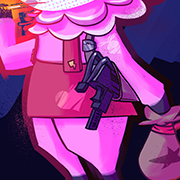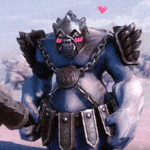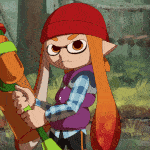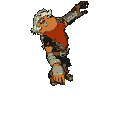|
As long as I don't play games that are in my own genre, it doesn't feel very work-like to do so. I've noticed I appreciate different things, and I am exceedingly good at guessing where collectibles will be, but aside from that it still feels just as fun to play as it did 15 years ago. I've also become an 'activist' buyer, often buying games that aren't necessarily my jam because I want to support their creators. On the other hand, I no longer have any interest in make-your-own-games like Minecraft, since it's literally what I do at work. I'm much more excited by the chance to play through someone else's vision now that I can execute my own. My team runs a 'mature' game in a 'mature' space, so there isn't really the R&D that would direct us to play competitors, but we as a company absolutely have teams play other games in a genre while they're hashing out a new project. Not only is it best practice to know what's out there, but it helps you have a cohesive language and a set of markers to compare your own game to. You can say "I want to have exciting player movement," or you can say "I want the fluid character movement from Horizon: Zero Dawn, but with jump jets also." One will get everyone to nod and agree and then go make their own thing that they think is exciting, and the other will give them a target to shoot for. And yeah, breadth of experience is good for everyone, but especially game designers. Just learn everything and it'll all apply someday...
|
|
|
|

|
| # ? Apr 19, 2024 02:09 |
|
ninjewtsu posted:how much do you devs play video games? does making video games consume all your free time? do you try to "check out the competition" or do you just play whatever is fun to you? Game development can be a full-time job so there are people specialized in dissecting competing games and market analysis. Even a developer that judiciously collects telemetric data on players might not have the expertise to utilize the information. Mid-sized developers and large publishers can hire a market research firm, such as EEDAR, or have an in-house team that is dedicated to understanding market trends. For example, Ubisoft has an editorial board that analyzes top selling games and uses that information when greenlighting new projects.
|
|
|
|
I remember watching a stream where someone got a Japanese developer to play his game released back in the 90s iirc. He sat down, fired up the game, pressed a combination of buttons on the controller and there were some photos hidden in the game's menu or something. Is this a common thing for you guys? Is there stuff in your games only you know about or is it now filtered out before games go gold?
|
|
|
|
Terminally Bored posted:I remember watching a stream where someone got a Japanese developer to play his game released back in the 90s iirc. He sat down, fired up the game, pressed a combination of buttons on the controller and there were some photos hidden in the game's menu or something. Is this a common thing for you guys? Is there stuff in your games only you know about or is it now filtered out before games go gold? We recently put up an Easter egg approval system to stop people from putting in inappropriate stuff that can cause harm to the games' image, so I guess what I'm saying it's getting less common and gets filtered out.
|
|
|
|
When looking for a job in the industry, does having a game available for sale on a service like Steam look any better than something that sits in your portfolio?
|
|
|
|
Terminally Bored posted:I remember watching a stream where someone got a Japanese developer to play his game released back in the 90s iirc. He sat down, fired up the game, pressed a combination of buttons on the controller and there were some photos hidden in the game's menu or something. Is this a common thing for you guys? Is there stuff in your games only you know about or is it now filtered out before games go gold? Hot Coffee was a turning point here. Easter Eggs and hidden stuff are much less interesting now since the whole industry watched a developer get taken to court and raked over the coals for unfinished content. As an artist, the only thing I ever dare to put in are my kids' birthdays and my anniversary whenever I need random numbers for something in the world like barcodes or serial numbers.
|
|
|
|
ninjewtsu posted:how much do you devs play video games? does making video games consume all your free time? do you try to "check out the competition" or do you just play whatever is fun to you? Playing games and making games scratch 2 different itches for me. That said, though, as an artist there's a general sense of "for every hour I'm playing a game all of the other artists out there are working on their art", especially currently while I'm unemployed so I don't play a ton. I've worked at studios where a lot of people, especially designers, would play competition or related games and then make videos of them for everyone else to watch. I know a lot of devs who watch Let's Plays while they work to at least keep informed.
|
|
|
|
mutata posted:Hot Coffee was a turning point here. Easter Eggs and hidden stuff are much less interesting now since the whole industry watched a developer get taken to court and raked over the coals for unfinished content. God, this. Don't work your arse off to join the games industry just to piss it away because you wanted to put a poo poo meme in a secret corner of a game, it will be found, you will be found out. It's not worth it.
|
|
|
|
Also any Easter Egg code almost by definition hasn’t had QA. It could potentially cause huge problems in multiplayer as it might give people a codepath to just crashing everyone’s game. There’s always room for fun delightful features in a game, but have process for it!
|
|
|
|
GC_ChrisReeves posted:God, this. See also: the Kek logo in Destiny 2.
|
|
|
|
ninjewtsu posted:how much do you devs play video games? does making video games consume all your free time? do you try to "check out the competition" or do you just play whatever is fun to you? I play every single game I can get my hands especially AAA even when I'm in crunch. I pretty much live breath and work videogames. Both for enjoyment and competition, I've also taken direct inspiration from the way certain games were made and put it into my work, its fun to deconstruct the games that do their thing really well. This is not mandatory but I just love videogames, both playing and dev. This is probably not a healthy way to live. Its a running joke amongst colleagues that I will play everything. I have a problem. Please help me.
|
|
|
|
Sunning posted:Game development can be a full-time job so there are people specialized in dissecting competing games and market analysis. Even a developer that judiciously collects telemetric data on players might not have the expertise to utilize the information. Mid-sized developers and large publishers can hire a market research firm, such as EEDAR, or have an in-house team that is dedicated to understanding market trends. For example, Ubisoft has an editorial board that analyzes top selling games and uses that information when greenlighting new projects. this is certainly the case for how some large publishers work, and I don't think it's necessarily as relevant for artists and engineers, but for designers I think it's kinda mandatory to play a lot of games and be able to critically analyze what did and didn't work in them. If you can't discuss your favorite and least favorite games you played in the past year, what did and didn't work in them, and why, it's really hard for me to get a handle on your design sense. I don't think you have to play everything, and I don't really care what specifically you play, but you should play games and be able to break them down and talk about them in a thoughtful way if you want to be a game designer (in my opinion).
|
|
|
|
Terminally Bored posted:I remember watching a stream where someone got a Japanese developer to play his game released back in the 90s iirc. He sat down, fired up the game, pressed a combination of buttons on the controller and there were some photos hidden in the game's menu or something. Is this a common thing for you guys? Is there stuff in your games only you know about or is it now filtered out before games go gold? Also I figure I might as well pop in and out of this thread. I'm an ex-EA Sports employee, worked on Tiger and Madden for many, many years as a UI programmer and now lead a UI team in London at Splash Damage. Ostentatious posted:When looking for a job in the industry, does having a game available for sale on a service like Steam look any better than something that sits in your portfolio? ninjewtsu posted:how much do you devs play video games? does making video games consume all your free time? do you try to "check out the competition" or do you just play whatever is fun to you? That said I do know people who aren't gamers but still work in the industry. One of them is a programmer and it doesn't affect him a lot, mostly when it came to working on Madden and he could program all sorts of things but he didn't understand the core mechanics of the game of football so when a bug got entered about a penalty flag giving the incorrect penalty yards he had no idea what they should be normally. I've seen it more of a problem for a UI designer I know who doesn't play games at all really and when he had to do some designs for a new user flow he wasn't sure what games had come out recently that had a similar system he could look at. real_scud fucked around with this message at 13:29 on Nov 6, 2017 |
|
|
|
What's the very first thing that happens in the game's development? I'm asking about the high budget games, since most of the indie games start with a tech demo or a game jam or something. But how does a big franchise start? Is there a committee deciding that a company needs something in this or that genre or do they ask the artists to draw some sketches or do they gather up their producers and ask for ideas? You guys mentioned that even the biggest companies nowadays don't really have time nor money to fuel R&D so how do they come up with stuff?
|
|
|
|
How many professional game designers come from a specific design course or program in college, vs how many just got a compsci degree or something and ended up being better at designing than building? What's the path to being a designer look like? An artist or a programmer could find work out of the industry, but game design seems like a very industry specific job, so it's less clear to me how I'd become one if I wanted to vs just about any other job in the industry I can think of
|
|
|
|
ninjewtsu posted:How many professional game designers come from a specific design course or program in college, vs how many just got a compsci degree or something and ended up being better at designing than building? It depends on the generation of the dev. In ye olden times, most design ( and art lol) was always handled by a programmer because only they could implement things. Now days, it's a mix and depends on the project and/or tool chain. I've been on both tech-heavy and art-heavy projects which lean one way or another. Most folks I've worked with came from QA, production or art backgrounds with usually a fine arts or comp sci degree from 15-20 years ago. I'd say that's slowly turning around with the younger and indie teams whom now either only have "game school" background and experience. The secret sauce to game design is that there is no secret sauce! Anyone with an idea and opposable thumbs can become a game designer. But the good ones have other training and skill sets to bring to the table. Having either art or code skills will greatly help. Slayerjerman fucked around with this message at 06:18 on Nov 7, 2017 |
|
|
|
Terminally Bored posted:What's the very first thing that happens in the game's development? I'm asking about the high budget games, since most of the indie games start with a tech demo or a game jam or something. But how does a big franchise start? Is there a committee deciding that a company needs something in this or that genre or do they ask the artists to draw some sketches or do they gather up their producers and ask for ideas? mutata posted:An infographic of an average game dev cycle what I made: Ideation is what I call the first steps and for large franchises it usually begins with the people in director level roles (creative director, art director, director, etc) getting together as a small team to just... decide. It's always been surreal to me that even the biggest AAA games begin with a few people just going "hey, we should totally do *thing*..." That said, it's never that simple, obviously. They'll gradually loop in people (usually senior roles) to help contribute or help communicate ideas (concept, writing, etc) and then comes multiple stages of approvals and check-ins with hire ups etc. This usually happens while a previous project is in deep production or wrapping up stages.
|
|
|
|
mutata posted:Ideation is what I call the first steps and for large franchises it usually begins with the people in director level roles (creative director, art director, director, etc) getting together as a small team to just... decide. It's always been surreal to me that even the biggest AAA games begin with a few people just going "hey, we should totally do *thing*..." That said, it's never that simple, obviously. They'll gradually loop in people (usually senior roles) to help contribute or help communicate ideas (concept, writing, etc) and then comes multiple stages of approvals and check-ins with hire ups etc. This usually happens while a previous project is in deep production or wrapping up stages. The "pitch" or greenlight or whatever is building up to being able to answer 3 questions: - Is this game worth being made - Can this team make it - Do the team want to make it Genesis of games generally comes from one of already knowing the answer to one of those three, and most commonly the latter. Someone goes "hey wouldn't it be cool if..." and people agree and then you do the work to answer the questions of whether that would bankrupt you or be a technical nightmare. But sometimes it can come from other places. It can be "man, a game like *this* would make sooo much money right now..." and then you find out if the team are psyched about making that and are capable of doing so. Or even you just go "huh, if we made *thing* then you could actually build a game around that. That would be pretty sweet". And then you do. This is often the case with emergent tech like AR/VR where you realise what is technically possible first. So really games can have their origins for a few different reasons, but in the most part i'd say it's because it's something someone is passionate about doing, and that's important. (Where i've said "technically possible" it's the easy part of "can this team make it?". Depending on the game having the right artists or designers or even producers could be the critical failure point.) MissMarple fucked around with this message at 15:18 on Nov 7, 2017 |
|
|
|
Terminally Bored posted:I remember watching a stream where someone got a Japanese developer to play his game released back in the 90s iirc. He sat down, fired up the game, pressed a combination of buttons on the controller and there were some photos hidden in the game's menu or something. Is this a common thing for you guys? Is there stuff in your games only you know about or is it now filtered out before games go gold? We have a few references to previous games, various memes and internet videos, inside jokes, etc. in our games. Smaller studios are more likely to get away with this sort of stuff, and in our case a lot of 'easter egg' stuff is what we do in our games in the first place, which is especially important in VR. I think the hot coffee thing was definitely a turning point, but the industry is also just much older now. Donkey Kong 64's multiplayer was haphazardly added in a week of intense crunch -- with console certifications it's much harder to rush in additional content at the last minute since it all needs to be tested properly for compatibility, and the tests get more strict with each console generation as more use cases are found and need proper testing. Also, with attitudes towards crunch (thankfully) changing, there's less time to add stuff last-minute, especially since that time now tends to go more toward polishing existing features. Also, most cheat codes that were just button presses on menus were meant for dev testing anyhow. These days our tools are much more sophisticated, and it's possible to do a lot more testing in-engine now that the hardware for creating games generally isn't specialized.
|
|
|
|
quote:How many professional game designers come from a specific design course or program in college, vs how many just got a compsci degree or something and ended up being better at designing than building? At my old shop, no two people at the same educational background. We had a marine biology doctorate, an entomologist, an architect, a professional musician, a film school grad, a molecular biologist / geneticist, and a PS / English degree. I see more game program grads today but designers tend to be diverse. quote:What's the path to being a designer look like? If you have zero experience and want to get into design, your best bet is probably to shoot for a QA spot or an entry-level design spot (which is sometimes / often level design or scripting work). Really, all you want to do is get in the door and be part of the team – if you have design aspirations, you will be able to worm your way into an opportunity to do some design work or work with people doing design. Design is pretty central at most devs, so you generally want it bubble up from within. Keep in mind that there are shops that go out of their way to segregate disciplines and, if you’re at one of these, migrating from something else into design will be difficult / impossible. At some places, even talking to someone not in your department is difficult. Programs are not an end-all. They certainly are not a negative, but they aren’t a guarantee either. Most of the people I know just want to see that you’ve done something. You don’t need a formal program to do that. We live in the days of free engines, free compilers, free modeling tools, easily available online tutorials, and so forth – if you want to be in games, there’s no great excuse to have not built stuff on your own nowadays. (That will probably change as the industry continues to mature? Many people think degrees will become the norm. Maybe not – we’ve been writing books for a long time and a lot of people do it without a BA in writing.) quote:The secret sauce to game design is that there is no secret sauce! Anyone with an idea and opposable thumbs can become a game designer. This is a lot like saying “anyone with opposable thumbs can become a neurosurgeon.” If you mean “anyone can sit down and design a game” like “anyone can write a story” or “anyone can cook a meal”, yeah it is 100% true. If you mean “anyone can become a professional game designer”, you're concealing a lot of the difficult work required to get there. The idea that anyone can do it is at the root of a lot of wasted time and money in this business.
|
|
|
|
Difficulty grade/curve design, at what stages does that happen and who drives it? I assume it's largely the same as balancing, but for games with pre-designed levels, what is the process? Do you build a bunch of levels, playtest them individually, and then try to order them by how hard they are, or do you shuffle around geometry in each level until it hits the goal? How much tuning goes into selectable difficulty grades versus how much is just taking a guess and shipping it?
|
|
|
|
|
Mother posted:Keep in mind that there are shops that go out of their way to segregate disciplines and, if you’re at one of these, migrating from something else into design will be difficult / impossible. At some places, even talking to someone not in your department is difficult. why do they do this?
|
|
|
|
ninjewtsu posted:How many professional game designers come from a specific design course or program in college, vs how many just got a compsci degree or something and ended up being better at designing than building? In the modern industry, the capability to make games is so democratized that there's really no reason for you not to have designed *something* on your own. That's the best path in at this point, I'd think. QA can be a path, but it's hard and highly competitive, so getting in at a small studio first or being a super stand-out at a large studio are really the only way to do it from that path.
|
|
|
|
quote:why do they do this? I'd say they feel it helps to keep things focused and productive. Above 70 people or so, loose /collaborative approaches suffer if they aren't very well managed or if you don't have a high degree of trust / shared brain. If you're on a team with hundreds of devs working on the same game, they are going to have some defined rules in place about comms. There are places that are draconian about this and there are places with a more gentle approach, but at that scale there's generally a lot more structure.
|
|
|
|
Figured I'd chime in as well, artist/UI designer in the game industryninjewtsu posted:why do they do this? Like others have said it varies; sometimes it's a powertripping thing, sometimes it's to prevent powertripping. Some folks get it in their head that the entire project rides on their back so they "go the extra mile" and start dipping into decisions outside the normal flow, and this would help prevent that ("stay in your lane", etc.). On the other hand, it also tends to create little fiefdoms where inter-disciplinary decisions/ideas have a hard time taking root or finding a place where the buck stops, so things get kinda compromised to hell as different departments vie for control over their part of it. Really it comes down to the culture of the studio, and if you're interviewing and you wanna find out, two great questions are: "With my discipline/department, where does the buck stop as far as decisions go?" (mainly asking which person/people ultimately hold responsibility for saying "this is what/how it's getting done") and "How open is my department to both giving and receiving ideas from outside its primary focus?"
|
|
|
|
One question that I legitimately have actually, there's so many huge studios with ~MILLIONS~ of people and yet indie games like undertale take one, or whatnot. I know there's things called skunkworks where it's "hey make 3 man team, make prototype, see if prototype fun or has potential, shift more people onto team to finish" but I've never heard of them in the thread about the process so far. Is it just a huge rarity that they succeed or that studios would even have them or do they not exist or...
|
|
|
|
Forer posted:One question that I legitimately have actually, there's so many huge studios with ~MILLIONS~ of people and yet indie games like undertale take one, or whatnot. I know there's things called skunkworks where it's "hey make 3 man team, make prototype, see if prototype fun or has potential, shift more people onto team to finish" but I've never heard of them in the thread about the process so far. Is it just a huge rarity that they succeed or that studios would even have them or do they not exist or... This has already been covered by multiple people and you seem to have answered your own question...twice... 
|
|
|
|
nielsm posted:Difficulty grade/curve design, at what stages does that happen and who drives it? I assume it's largely the same as balancing, but for games with pre-designed levels, what is the process? Do you build a bunch of levels, playtest them individually, and then try to order them by how hard they are, or do you shuffle around geometry in each level until it hits the goal? It varies. I worked on at least one game where the levels were pretty short and small, so we made a big batch of them with the easy ones that were meant to teach the mechanics in a very slow, forgiving way at the beginning (obviously) and the harder ones that tested your mastery of the mechanics at the end (again, obviously) But since there were a lot of levels between those two extremes, we playtested them constantly, timed ourselves, counted our deaths, etc. etc. until we felt confident that we had the overall difficulty curve in the correct place. We also shifted levels around so you weren't doing the same kinds of puzzles and using the same mechanics over and over. For that project, it wasn't about changing specific geometry in the levels in order to make them harder or easier, but where they fell in the overall progression of the game. When I started in the industry, the way difficulty was tuned was basically the easier modes have more pickups (ammo, health, etc.) and fewer enemies and the harder modes have more enemies and fewer pickups. In an FPS at least, that was a pretty standard way to tune difficulty. I think there's a lot more dynamism nowadays though, and difficulty is handled systemically in code. There was a Twitter thread a couple of months ago with devs talking about what kind of tricks they employed to get difficulty right, and there were a lot of clever things like this https://twitter.com/levine/status/903803566825119745 The whole thread stems from this if you're interested in digging through it: https://twitter.com/Gaohmee/status/903510060197744640 No game I've ever worked on has been "just take a guess and ship it" though. That would be extremely foolish. I wouldn't be surprised if a lot of early games basically did that though... edit: sorry mutata, I realize I didn't verify before throwing down with some answers, but I am genuinely a dev. If you want to add me to the OP I'm primarily a game / level designer but also have a couple of sound design credits as well Whistling Asshole fucked around with this message at 12:49 on Nov 12, 2017 |
|
|
|
Whistling rear end in a top hat posted:
Counterpoint “Internally, we had this super hardcore test group – we’ve got a lot of hardcore players at Blizzard – that tested Inferno, and we got it to the point where they thought it was challenging enough,” Blizzard’s Jay Wilson told IGN. “Then we doubled it. Because we knew, no matter how good we are, our players are gonna be better. We focused on making that as difficult as we could make it.” For those of you long enough in the industry, how was this received? I remember a lot of backlash from the gaming community but would like to understand if this is an accepted way to do things (pretty sure it isn't). EDIT: Just googled the bloke. Apparently he has left game design and D3 fans are STILL mad at him. Baxta fucked around with this message at 04:38 on Nov 13, 2017 |
|
|
|
Baxta posted:Counterpoint Yeah that seems like a bad way to do difficulty. I've never worked at Blizzard, but if any place has the resources and manpower to adequately test and balance a game, I'm sure they do. So if their usability / test teams came to some consensus where they said, "ok this feels like a proper difficulty scale" to then arbitrarily double that difficulty seems ill advised. Having said that, I don't envy the position Jay Wilson was in, being lead designer for a beloved and highly scrutinized franchise that every single gamer on earth felt like they could have designed better. The thing people don't realize about being a designer is that it can be an extremely stressful, high pressure job because you're making decisions every day that shape the game and if it's poorly received, it can ruin your career. Especially if it's for a game as high profile as Diablo 3. He also had to deal with the indignity of one of the franchise creators publicly trashing the game to which Wilson infamously replied, "gently caress that loser." Hindsight is 20/20, but when you're in there grinding it out day after day it can be really hard to make consistently good design decisions. Game design is not a science and fun is not a quantifiable thing.
|
|
|
|
Baxta posted:Counterpoint I feel like this is something Blizzard has started working through in WoW, where they'll have Super Hard Mode come out the week after a raid's release, giving them time to fine tune. Trying to gauge how a playerbase will approach the highest difficulty of a game when you've got both a Blizzard size audience and a new game is incredibly difficult. Diablo 3 had sold 12 million copies by the end of 2012. So, even if they'd only had .1% of their base go for the highest difficulty content, it still would've been 12,000 players, which is much more than Blizzard is likely to hire themselves for testing, and those players were probably playing more hours than a normal work week has. If they had long-term historical data or even "hey here's how players are doing with everything leading up to this point in the past week" Inferno would've probably had much better tuning. "Doubling it" seems like a very arbitrary statement, but it's likely that Blizzard's highest tier of difficulty still would've been too easy if it was only based on their own internal playtests. How about this, the answer should never be "take a guess and ship it," but there's definitely "take an estimated guess and ship it." I'm a production nerd in mobile, I love asking for hypothesis, test cases, and business value 
|
|
|
|
ninjewtsu posted:how much do you devs play video games? does making video games consume all your free time? do you try to "check out the competition" or do you just play whatever is fun to you? We also play tabletop RPGs and board games a fair amount at Obsidian, though it gets difficult when crunch time hits.
|
|
|
|
Mother posted:If you mean “anyone can sit down and design a game” like “anyone can write a story” or “anyone can cook a meal”, yeah it is 100% true. If you mean “anyone can become a professional game designer”, you're concealing a lot of the difficult work required to get there.
|
|
|
|
Baxta posted:Counterpoint This didn't work out for D3 but I remembering hearing stories about them doing this for certain Dark Souls (I think, might be another notably difficult game) bosses and it working out, basically doubly or tripling the difficulty of a really hard boss and somehow it winds up clicking. If your design structure incorporates / relies on player feedback pretty heavily then it might be good, even necessary, to just throw stuff out there, as long as you're communicating it properly and willing to revert or change if it doesn't work out. Speaking personally, though, I'd rather make something I can beat through some difficulty, then tune it up if folks get used to it or want a harder challenge. In UI I thrive off feedback, but the goal is always to get to the same level of confidence with my designs a bridge architect would have in their bridge. rope kid posted:Anyone can design a game. Most people will do an awful job. Yeah, it's like Ratatouille; it's not that everyone can design a great game, but a great game designer can come from anywhere.
|
|
|
|
I don't understand why developers designing difficulty in a PvE space don't apply cogpsych. Like, there's a massive, relatively well-developed and backed literature on cognitive load, reaction time, perception, all the things that go into low-level decisionmaking, much of it a google away (this is alongside player feedback, ofc, not to replace it). Yet I keep seeing the dumbest decisions being made with regard to difficulty tweaks that don't take baseline cognition limits into account. "Well, our game initially gave players .45 seconds minimum to respond to incoming fire, but they hungered for a greater challenge. So we added a difficulty where the time was decreased to react in .15 seconds. And we doubled enemy health, halved the headshot damage players could do, and multiplied enemy damage and accuracy by 3. Now people are angry for some reason, talking about 'unfair and unresponsive' difficulty where they 'can't tell what's shooting them before they die' and I have no clue why". "We just wanted to give players the Dark Souls Experience they were asking for."
|
|
|
|
Baxta posted:Counterpoint This depends heavily on the type of game and the audience for said game. Single-player games are drastically easier than complex co-op games. When I was tuning hardcore difficulty on Dungeon Siege 3, I chose values that I personally found to be seriously challenging but which I could imagine myself reasonably beating (or that I did beat myself). I had just finished Demons' Souls and felt like that was roughly the target difficulty/engagement I was looking for. For normal and easy, I had to use feedback from watching playtesters and the team, because those difficulties felt "too easy" for me personally, but I knew that too easy was correct in those cases. Obviously once the game came out, players figured out strategies that made Hardcore easier, but for the most part the game played as I expected. Having moved onto WoW, as you can imagine, tuning an MMO encounter is many times more complicated because you have many more vectors of challenge and you are trying to engage and challenge a large number of players simultaneously who have very distinct roles. I don't think there's really any equivalent experience in game-design. Now that I've done raid encounter tuning, it kinda bums me out that so few designers will get to actually design, tune, and see a PvE MMO encounter play out in their careers now that the MMO gold rush has petered out. All I can say is that, after having worked on a PvE MMO, I'm more convinced than ever that there are no right answers in design and that it's much more complex and tricky than players (and many designers) consider.
|
|
|
|
ninjewtsu posted:how much do you devs play video games? does making video games consume all your free time? do you try to "check out the competition" or do you just play whatever is fun to you? I don't really play games for any kind of analysis as my job title doesn't necessarily precipitate that; I just code out things that I'm told to code out. As for playing games in my free time, not as much as I used to. It might be more for personal reasons than the job, but I'm sure it's still part of the reason. I come from the QuakeWorld -> UT2k3 era of multiplayer gaming and kind of gave up on playing anything multiplayer. My new niche seems to be open world games but I'm getting more or less tired of those too. I'm either watching shows or contemplating of knocking down my gaming backlog, which then I struggle with because I feel like I should be spending time trying to learn other professional skills. ninjewtsu posted:i recall a story about how, before making the xcom remake, the xcom team at firaxis were all required to play through the original game. how often does playing other games come up at work? Artists that built out the SnapMap modules for DOOM had to regularly keep up with the main campaign while it was still in development, to keep up with the art style. I only dipped into the main game a handful of times to test how a thing behaves in the main game and replicate it properly for SnapMap. It was a real pleasant surprise playing through the entire game a couple of months before release as it turned out to be one of my favorite games. I liked the game when I was just dev'ing SnapMap but id definitely knocked the main campaign out of the park.
|
|
|
|
Discendo Vox posted:"We just wanted to give players the Dark Souls Experience they were asking for." This is one of the things that always comes up as a red flag when folks mention it as part of their game, because almost always they have no idea of all the cohesive systems that went into making Dark Souls feel hard but kept the player going. When they put in the stuff you mention, the game loses that "call-and-response" difficulty that actually makes the game challenging yet fun.
|
|
|
|
turnways posted:This is one of the things that always comes up as a red flag when folks mention it as part of their game, because almost always they have no idea of all the cohesive systems that went into making Dark Souls feel hard but kept the player going. When they put in the stuff you mention, the game loses that "call-and-response" difficulty that actually makes the game challenging yet fun. Yeah this, this so much this, alot of people do not get why dark souls felt so hard. It is, to be sure, not an easy game, but it uses a whole ton of design techniques to amplify the feeling of "this game is hard" without actually increasing the difficulty. Take, as a tiny, tiny trick of artificially increasing the feeling of difficulty, the game over screen. You die, a few seconds of nothing, then in big, bold letters, "YOU DIED", along with a very distinctive sound affect, along with losing control of your camera. The Prominent placement of text, the sound affect, being unable to distract yourself with the controls; its all there to reinforce the memory of dying, to make sure you remember your failures caused by the difficulty, to make the game feel harder. Now compare dark souls to a slot machine, which uses its win/fail states to accomplish the exact opposite affect. Whenever you win on a slot machine, it plays a distinctive tune to reinforce the feeling / memory of victory, displays flashing graphics to reinforce the memory, maybe it makes you wait time as coins come rolling out of the machine (creating a sound from the physical act of the coins) . Whenever you lose, it plays no sound or a minor amount of sound, no extra graphics beyond what's necessary to display gamestate, and very quickly resets, allowing you to start playing again and forget about your loss. Dark souls is doing that poo poo -all over the game-. It's tone reinforces difficulty (scary! dark! dangerous!), It's tutorialization reinforces difficulty (you learn about new mechanic by being killed by them, rather than having them explained to you), It's writing reinforces difficulty (there's a reason there is always a character who has given up in the face of the in-game plot's difficulty, and tells you that your goal is impossible). It's using every trick it can think of to make you feel like the game is harder than it is. Hell, It's XP system reinforces difficulty. It's XP System! Mechanically speaking, XP systems literally reduce difficulty for struggling players! Dying on a boss? You can go kill skeletons, get two levels, do more damage and have more health, and suddenly the boss encounter is 20 seconds shorter / you can make one more mistake without dying. But in dark souls, because when you die you lose your XP (souls), it feels like you've been punished for dying, that you've lost something, and that feels difficult; Even though when you manage to reach the position where you died, you regain all that XP plus the XP from your current run, so when you finally make it to a bonfire (save point) you've actually, mechanically speaking, being rewarded for dying with an easier difficulty level. Imagine if dark souls had you exclusively gain XP when you reached new bonfires, and that XP was equal to the expected XP for all the monsters you'd fight along the way to the bonfire. Same difficulty curve for players who don't die, but there would be no way to cheese by farming XP and gaining an advantage over bosses, no difficulty decrease for players who struggle and make it to a bonfire with triple the XP of a living player; mechanically speaking, the game would be harder than its current form. But it wouldn't feel harder. Dark souls is really loving smart, but alot of game designers take the wrong lessons from it. Rob Filter fucked around with this message at 04:31 on Nov 14, 2017 |
|
|
|

|
| # ? Apr 19, 2024 02:09 |
|
Due to recent events, I want to ask what you dev types think about loot boxes, hopefully in a more impartial and analytical way than I have seen on the social medias. Do you think they are good/bad? Do you think they COULD be good/bad? Do dev's see any of the extra money that comes from loot box purchases? Do you think they add value/take away value from the game you worked on?
|
|
|





































